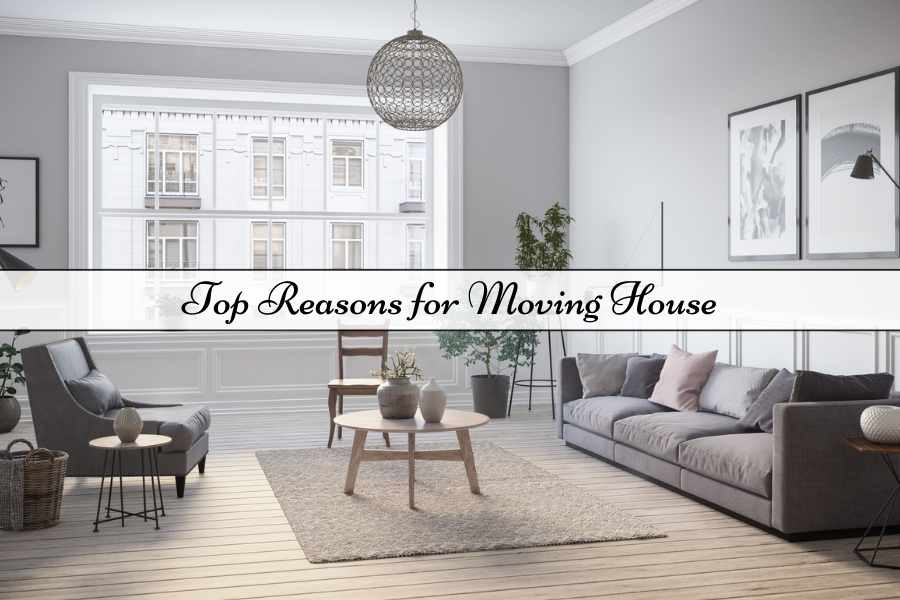Can't decide if you should move house? These are the 15 top reasons for moving house with practical steps to help you decide if you should move.
Moving house is a big decision. When deciding to move, you should consider how it may impact on all aspects of your life. You should consider the impact on your:
Health
Family & Friends
Relationships
Finances
Career
These areas contribute to life happiness and satisfaction, and are key reasons why people choose to move.
Whilst it may not be the case that moving house will positively impact on all of these areas, if the pros outweigh the cons, then it might just be time to consider a move.
This post is all about the 15 top reasons for moving house with practical steps to help you decide if you should move.
Moving for Health
It will come as no surprise that your health, both physical and mental, is one of the most important things in life . If your health is declining, your current home may no longer be suitable.
Depending on your circumstances, things to consider when moving house for health reasons are:
1.) Ease of use and space
Too many stairs or little space in your current home can be problematic if you're suffering from certain health conditions. Moving to a more accessible home for your needs can greatly improve the quality of your life.
2.) Proximity to hospitals
If health is a concern, you may wish to move to an area that has quick access to a hospital or health care. Living far out in the sticks can be inconvenient or unsafe if you're regularly unwell. It can also give you peace of mind knowing that a hospital is nearby should you urgently need one.
3.) Pollution

Whilst some pollution is expected when living the city life, if you've started suffering from asthma or breathing difficulties, this may be a reason to consider moving somewhere that is less polluted with more green space. Avoiding main roads and city centres may also help relive your symptoms.
4.) Noise
Whilst most people will get used to noise levels outside their house, there may become a time when the blaring sirens and increasing traffic becomes too much. This can take a toll on both your physical and mental health.
If noise has increased to a noticeable level, your sleep or ability to concentrate may be suffering. Avoiding loud noises could also be a top priority if you have constant ringing in your ears (i.e tinnitus).
You are likely to experience increased noise living right next to the following areas:
Moving somewhere for a quieter life may be just what you need.
On the flip side, you may find your current home is too quiet and isolating, which can be equally difficult, especially if you are living alone. Being able to hear a pin drop can be unsettling, so you might find some background noise (i.e humming of traffic on a busy street) surprisingly comforting.
You could just be that someone who loves being in the noisy hustle and bustle where it's all happening. If that's the case, you can cross that quiet, country home off your list.
5.) Safety

Feeling safe and comfortable wherever you live is a must. If you're beginning to feel uneasy in your own home and are constantly anxious about your health and safety, it's time to seriously consider moving.
Safety concerns may arise for many different reasons. Some of these can include:
- High crime rates in the area, such as increased burglaries
- People you live with or others knowing where you live may create an unsafe environment
- Busy main roads can be a danger to young children. If your child runs out into the road, there is an increased risk of accidents
- Very isolated areas can be unsafe if there is nobody nearby to call for help. If you're living on your own, you may not want to walk down isolated streets alone
6.) Neighbours
Your neighbours can be an essential part of your community, a close friend, or they may keep themselves to themselves. However, some of us aren't so lucky, and end up with nightmare neighbours.
If you've been having endless arguments and disputes with your neighbours, it can place a massive strain on your wellbeing given they are next to your living space. If you are in a position to move, escaping your neighbours might be one of the best decisions you've ever made.
7.) Fresh start
It's very easy to get stuck in a rut with bad habits and past memories. Moving to a new area might be exactly what you need to kick start your life. Ditch the old habits, meet new people, and pick up new hobbies.
Depending on your preferences and the lifestyle you wish to lead, there are a variety of amenities you may wish to be near, such as fitness centres, places of worship, book clubs, and so on.
Moving for Family & Friends

Family and friends are another key factor to consider when deciding to move house. The most common reasons that you should consider (if applicable) include:
8.) Children
Families may decide it's time for a move in order to benefit their children. This may include:
- Locating near good schools, parks and playgrounds
- Expanding families needing more space
- Avoiding busy areas and main roads for their children's safety
- Locating near a larger support network of family and friends for help
- Children having certain health conditions (see Reason 1: Health)
On the other hand, it may be the case that your children are now all grown up and you have far too much space on your hands. Downsizing or moving to your dream home in the country may now be the perfect timing for you.
9.) Elderly relatives or extended family
You may have elderly relatives or extended family that need some extra care and assistance. Moving nearby will mean you can spend less time travelling and more time helping your loved ones.
10.) Pets
If your poodle is your priority, there is nothing wrong with having your eye set on the house next to the poodle parlour.
You may wish to move to an area with more outside, green space for your pets to run around. Avoiding main roads may also become a priority should your beloved pet have a tendency to dash out and chase every squirrel, pigeon and insect under the sun.
11.) New support network
Moving near family and friends can come with many benefits. However, there is also the flip side. Friends and relatives already living nearby may be driving you up the wall.
Being surrounded by toxic family or friends on your door step can be completely draining. Moving house deserves some careful thought for the sake of your own happiness. Surrounding yourself with better, like-minded people could do you the world of good and help relieve your constant headache.
Remember, blood is not always thicker than water and it might just be time to pack up and give a final ciao !
Moving for Relationships

12.) Long-distance or serious relationship
Many will consider moving for their significant other. This may be the case if you've been doing long-distance for a while or want to start building your lives together. Some will also consider moving to develop a fairly new relationship.
The decision to move for a romantic partner is a whole separate topic. However, you should always keep in mind that relationships change over time, so do not rush the decision !
Whilst you may feel that this person is the one, you should also fully understand what you will be sacrificing. If you're having to give up your career, health, family and friends, or your personal finances are taking a serious hit, you may want to reconsider.
13.) Single life
Moving to a new area can be a great opportunity to meet new people if there is no relationship in sight or if you are newly single after a big breakup.
It goes without saying that if you're living in the sticks with chickens for company, the chances of the right person strolling into your house are next to none.
Moving due to Finances
14.) Change in income
When it comes to moving, unfortunately money does matter. Finances are one of the key reasons for moving house. Some may be forced to move and downsize due to financial strain, and others may be upsizing due to additional income.
You may also be looking to purchase a property as a first-time buyer for a long-term investment or now that you have greater financial independence.
But unless you've been exceptionally lucky and won the lottery or inherited a mini fortune, you will have to consider the costs of moving and budget wisely.
It is essential to know in advance whether you can afford to move and all the hidden costs of moving that you may not expect. This will help you avoid any nasty surprises further down the line.
Moving for your Career

15.) Commute
A new job in a different area is a key reason why people decide to move. Being closer to work with a short commute is ideal for most people. This gives you more free time to spend on the activities that you enjoy doing.
The average usual commute time in Great Britain was 27 minutes in 2021 (according to the UK Govt.'s transport statistics), but you might find your commute is much longer.
The good news is this may not matter so much if you're only commuting a couple days a week (yay to WfH!) but this isn't the case for everyone.
Whilst a 1+ hour commute each day might be manageable at first, it can leave you feeling utterly exhausted. This can slowly build up until most of your spare time is consumed by any additional sleep you can get. You may also find that your performance at work begins to suffer due to sheer exhaustion.
An additional bonus of moving nearer work is that you will also save on travel costs by not having to commute far. However, the extent of these additional savings will depend on where you live and may not be that significant.
So...Should you move house?
Now you know the top reasons for moving house, the question still remains whether you should move house. Here are 5 practical steps to help you decide if you should move.
Step 1: Write-down your dream home requirements
For the above 5 areas (health, family & friends, relationships, finance and career), write-down what you would like your dream home to include (i.e near hospital, quiet location etc).
This should be split into essential requirements (what is non-negotiable for you) and things that are nice to have (but not essential). This distinction should be made for all 5 areas.
Step 2: Establish how your current home meets those requirements
Tick off how many essential and nice to have points your current home meets. Does your current home tick only half your essential requirements and none of your nice to haves?
Step 3: Identify the benefits of moving house
For each of the 5 areas, write down the potential benefits that moving house will give you beyond what your current house is already providing you.
For example, if your dream home is living on a quiet road but you're already living on a quiet road, this should not be written down as a benefit of moving house. It should be written down as a benefit if you're currently living in a noisy area.
Step 4: Identify the cons of moving house
For each of the 5 areas, write down what you will be sacrificing when moving. If you move will you have to give up your weekly visit to your parents, or your favourite coffee mornings with your friends?
Step 5: Weigh up the pros and cons

However, it's also important to consider the essential vs nice to have distinction. You may only have 1 pro to moving house, but it meets your essential requirements. This may be enough to convince you to move despite having many small cons in the 'nice to have' areas.
What if the pros and cons are 50/50 and now you really can't decide? Hesitation is usually a sign in itself that you're not fully convinced on your reasons for moving house. If you do not have to move and aren't convinced after going through the 5-steps, there is no need to rush.
Moving house requires time, money, and effort. Depending on your life circumstances, it may be easier and more convenient to stay put for now. Postponing your move to a later date when you feel more certain that this is the right choice for you might be the best decision.


Comments